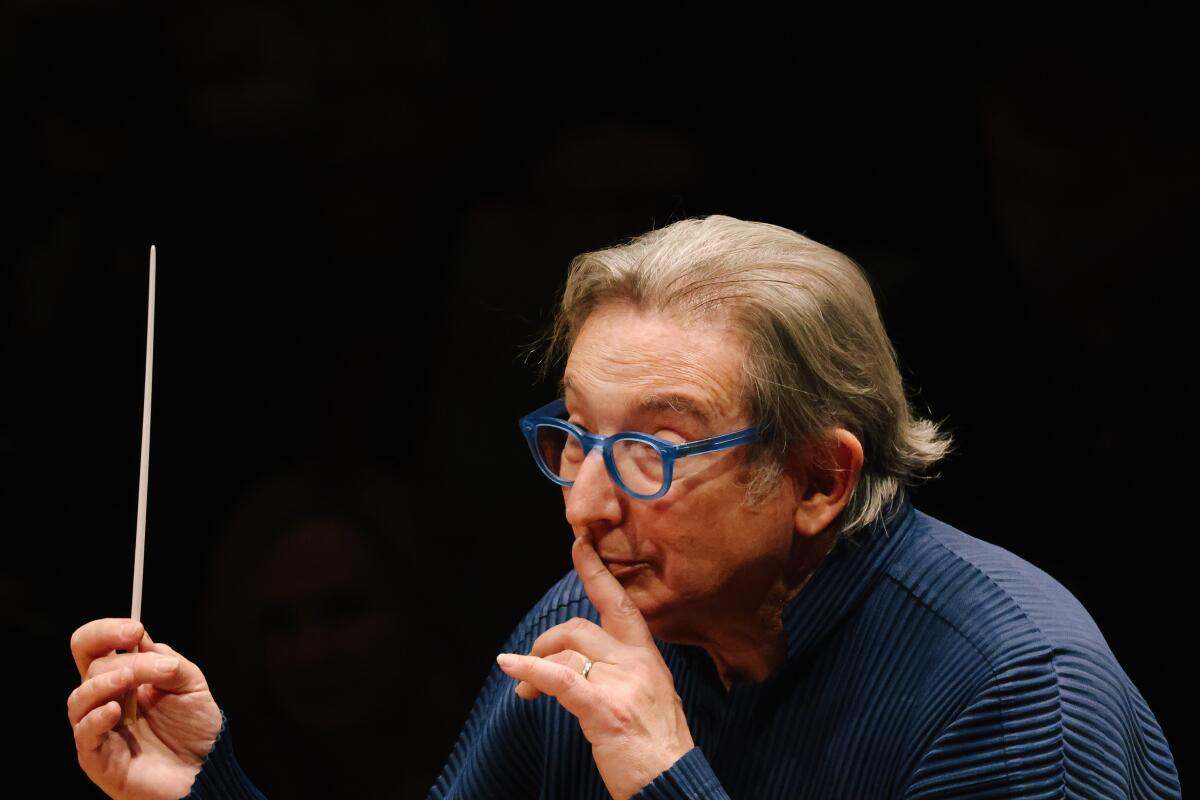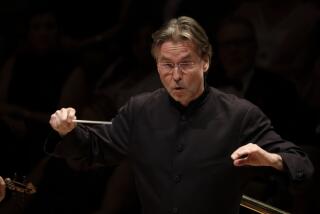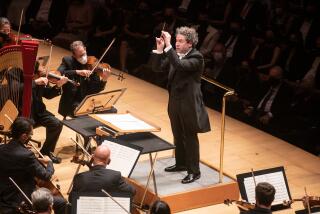Commentary: Michael Tilson Thomas charges ahead while in treatment for aggressive brain cancer

The concert was about to start and the hush was pregnant with, well, what?
Michael Tilson Thomas was back to conduct the Los Angeles Philharmonic. There was a full audience at Walt Disney Concert Hall. Neither of those was necessarily a certainty. Pandemic-battered audiences have been slow to return. MTT, as he is fondly known (and the 78-year-old conductor has been known to musical Angelenos since his days as a teenage prodigy here), was diagnosed with glioblastoma, an aggressive cancer in the brain, in spring 2022 after undergoing an earlier surgery. He has been in treatment ever since.
The conductor did almost nothing after acknowledging the warm and sustained applause as he walked, seemingly effortlessly, onstage. There was the hush and a signal to principal flutist Denis Bouriakov to begin Debussy’s “Prelude to the Afternoon of a Faun.” The flute solo made the hall pulsate with a full life of its own. When the orchestra came in, led by a harp glissando that was like a leap out of the void, the texture was rich and decadently sensual.
I met with Tilson Thomas the next afternoon. Monday’s storm was raging, and as I entered his hotel room on the beach in Santa Monica, the conductor was sitting very still in an armchair by the window, wearing a heavy plaid shirt and reading. Behind him, palm trees swayed and violent waves broke on the ocean. Another of his Debussy specialties, “La Mer,” could well have been the soundtrack for the scene.
We then spoke for two hours. Yes, he’s older than when I had last met with him before the pandemic and somewhat slower in his movements. He’s clearly thoughtful, but he’s always been that. The spark in his eyes hasn’t changed. Nor has his humor. If anything, the pandemic and his illness have gotten him more immersed in music than ever, and speaking about one piece led to another and another.
His memory remains exceptional. When speaking about his early days in L.A., it was Tilson Thomas who reminded me of the long-gone Hollywood ice cream parlor, C.C. Brown, of which I hadn’t thought about for ages. “They gave the fudge to you in a pitcher,” he dreamily recalled, “and you poured it on,” not unlike the way he poured the flute on Debussy. “It was really good.” As was the “Faun” and all that followed.
I mentioned that Canter’s delicatessen on Fairfax, another hangout from the old days, was still there. Tilson Thomas was quick to point out that Cohen’s, across the street, was better, reminding me that it had burned down when schmaltz (chicken fat) caught fire, which then led this grandson of the Yiddish theater star Boris Thomashefsky to do one of his hilarious riffs in Yiddish. Yes, MTT is MTT.
When he last conducted the L.A. Phil a year ago, that had seemed a miracle. It had been six months since he had had his brain tumor removed. His speech was slightly, but only slightly, off. Yet he led a potent performance of Berg’s “Three Pieces for Orchestra,” a work of ferocious complexity that requires exceptional cognitive capacity just to absorb as a listener, let alone conduct. Even so, when word got out that he was already making plans for his next visit a year later, eyebrows raised.
Throughout 2022, Tilson Thomas showed indefatigable resilience. He conducted in Prague, Munich, London, New York, Miami, Cleveland, San Francisco — you name it. His two-week L.A. Phil stint now is ambitious programming for any conductor. Along with Debussy’s “Faun” last weekend, he led Messiaen’s “Trois Petites Liturgies de la Présence Divine,” a fabulously intricate, half-hour multicolored extravaganza for solo piano, the theremin-like ondes Martenot, women’s chorus, strings and percussion, written in 1944 and never before performed by the orchestra. After intermission came an early Debussy rarity, “Fantaisie,” which is essentially a piano concerto, with Jean-Yves Thibaudet as soloist, as he had formidably been in the Messiaen. At the end was Villa-Lobos’ “Chôros No. 10,” an off-the-charts wild exposition of native Brazilian song and dance with the Los Angeles Master Chorale and the orchestra.
This weekend, he turns to Mahler‘s Ninth Symphony, the most profound symphony (I contend without reservation) ever written.
What does MTT have to say about all this? When asked about whether there was any overriding idea for the first program, Tilson Thomas says, “Ask Chad.” Tilson Thomas gave the L.A. Phil’s CEO Chad Smith his first job, when MTT was music director of the San Francisco Symphony. The two love to cook up programs together, and they’re at it again for next year.
But Tilson Thomas did playfully describe Messiaen’s sensory religiosity as “a kind of cocktail hour in heaven” and compared the Villa-Lobos’ “Chôros” to an old movie “with virgins and a volcano.” He is now about to do both of those works with the San Francisco Symphony, of which he was music director from 1995 to 2020.
These kinds of works, though, seem for Tilson Thomas more like technical puzzles than anything that requires deep thought. Although the puzzle solving does lead him to deep thought. He finds neither the overt mystery nor mysticism in Messiaen or Villa-Lobos as mysterious as what is behind some of the most familiar scores of the repertory, such as Schubert’s Ninth Symphony (the “Great”), which he recently conducted with the Cleveland Orchestra and will be conducting at the New York Philharmonic in March.
“One reason I got involved in doing these Schubert performances again,” he explains, “was that I had noticed over the years that when that piece would come up in the schedule, that more players asked to take that week off than any other piece in the repertoire.
“For the string players, especially, it’s really very exhausting. I just started to look at it to say, well ... what could I do to make this actually a pleasurable experience for people?”
And that led Tilson Thomas to rethink and experiment with bowing, tempo, repeats, the number of players to use and what is going on psychologically.
“Whenever that happens, I try to take into consideration, ‘OK, what is the nature of this music?’” he says. That leads him on to musing about the nature of music. And then on the nature of making music.
“As a performer, it’s not only the shape of the music and the idea of the music or the message of the music — of course, those, that’s the main thing — which I’m interested in, but I’m also interested in music from the standpoint of what it means to the people, bless their hearts, who are actually playing it. And how to make it a more joyous and engaging experience for them, because that, of course is going to change the whole meaning of it for the audience immediately.”
Obviously, the pandemic and then his illness have contributed to Tilson Thomas’ latest reflections on and sheer need to perform, something that is in his blood. But Tilson Thomas is also, at heart, a mentor. His mother was a school teacher in the San Fernando Valley, and Tilson Thomas has a reverence for education. He founded the New World Symphony in Miami Beach to train orchestra musicians, and part of Tilson Thomas’ legacy is that New World alums can be found in major orchestras around the country. The L.A. Phil is no exception.
But there is another part of his legacy that now obsesses Tilson Thomas. He didn’t speak about his cancer much in our conversation, other to say that he’s in a good period. “At my last MRI, the doctors were jubilant,” he announces.
“And I said, ‘Yeah, I get it. In other words, I’m still dying. But not as quickly as you would originally suppose.’ Well, in that case, I intend to make the most of it.”
That has led him to begin trying to dig out his piles of unfinished pieces he has composed over the decades and see what he can do with them. He has completed a number of major compositions in recent years, including the impressive, autumnal yet vibrantly eclectic song cycle “Meditations on Rilke,” which he conducted with the L.A. Phil last year.
But he also has many projects in various states of completion, including a huge pile of songs, many with his own lyrics. He’s written them for all kinds of singers. Sarah Vaughan once asked him to write something operatic for her, which is, he says “not really operatic but very big and lyrical, with the kind of rangy stuff she could sing, a mordant and wry and sentimental and caring mixture of things, which seems to be what I write about.
“It’s funny, over the years when I’ve been writing some new songs on these words of mine, I’ve taken them into sessions with my shrink of the time. I’d just read the lyrics, and these doctors would say, ‘I don’t know why you are paying me to come in and have these conversations. I mean, these words you’re writing are very, very insightful and have a profound understanding of the human condition.’
“I would reply, ‘Yeah, but you know, doc, it’s one thing to know these things, and it’s another thing to live these things.’”
One of the main projects in what Tilson Thomas calls “this bucket list of things that I really want to accomplish before I’m out of here” is “Shoah Shoah,” which had been intended for the 50th commemorative ceremony of the bombing of Hiroshima. In it, he brings together the definition of “Shoah” in Hebrew (“holocaust”) and the term used to describe the reign of Japanese Emperor Hirohito, “Shōwa,” meaning “bright peace.”
The inspiration comes from the large Buddhist bell rung every year at the ceremony. The bell has such rich overtones that different people, Tilson Thomas explains, hear different things. “So out of the tolling this series of melodies keep emerging. You’re just pulling those out, and that’s what you’re hearing.” Tilson Thomas says he would pair this with his 1990 orchestra piece, “From the Diary of Anne Frank,” which was written for Audrey Hepburn as narrator, and was given a memorable performance at the General Assembly of the United Nations.
That led to the discussion of Judaism in music, which led to his friendship with the composer Morton Feldman, who once invited him over to watch him compose. That led to Tilson Thomas talking about how he would do this and that to certain pieces, giving a glimpse into how he composes.
After two hours, he was far from finished. On the way out, I said I look forward to his Mahler Ninth, which he conducted with the San Francisco Symphony at Disney in 2005 as a life-and-death matter even then. “You know the main melody of the piece,” he said, standing by front of the open door, “that is only heard in at the climax of the first movement,” which he then sings. It becomes klezmer-like in the second and third movements, which he also sings and does a quick little dance step.
That’s Mahler telling us what people thought of him, and Tilson Thomas channeling Mahler’s own visits with Freud. Tilson Thomas interprets the way in the last movement Mahler ultimately turns the melody into one of the most moving symphonic movements in the literature as Mahler telling us who he really is.
It was also Tilson Thomas, speaking to the hallway and the vast world beyond telling us who he really is too. Outside the rain had stopped and the ocean had become calm. All that was missing was a rainbow.
More to Read
The biggest entertainment stories
Get our big stories about Hollywood, film, television, music, arts, culture and more right in your inbox as soon as they publish.
You may occasionally receive promotional content from the Los Angeles Times.







